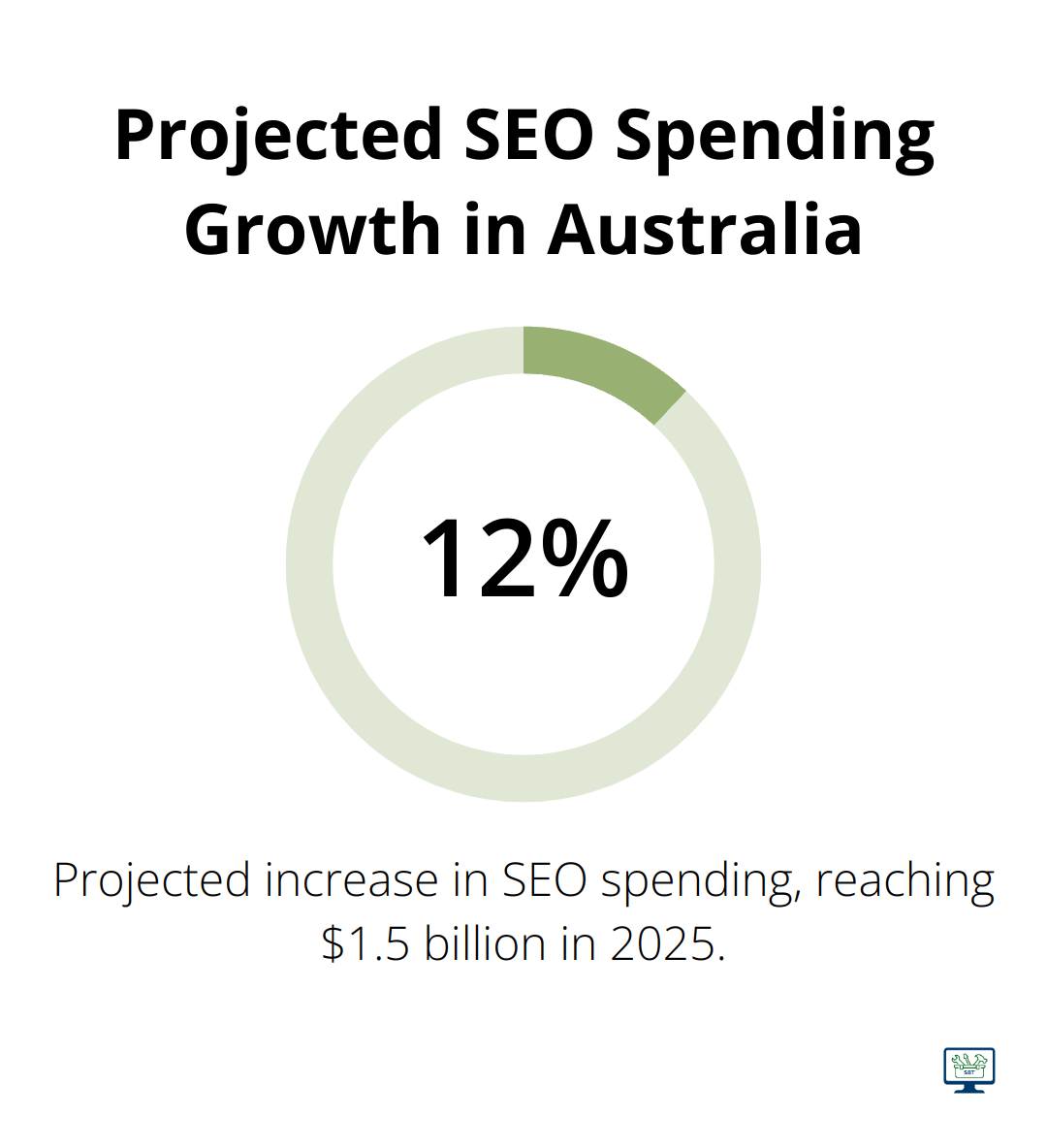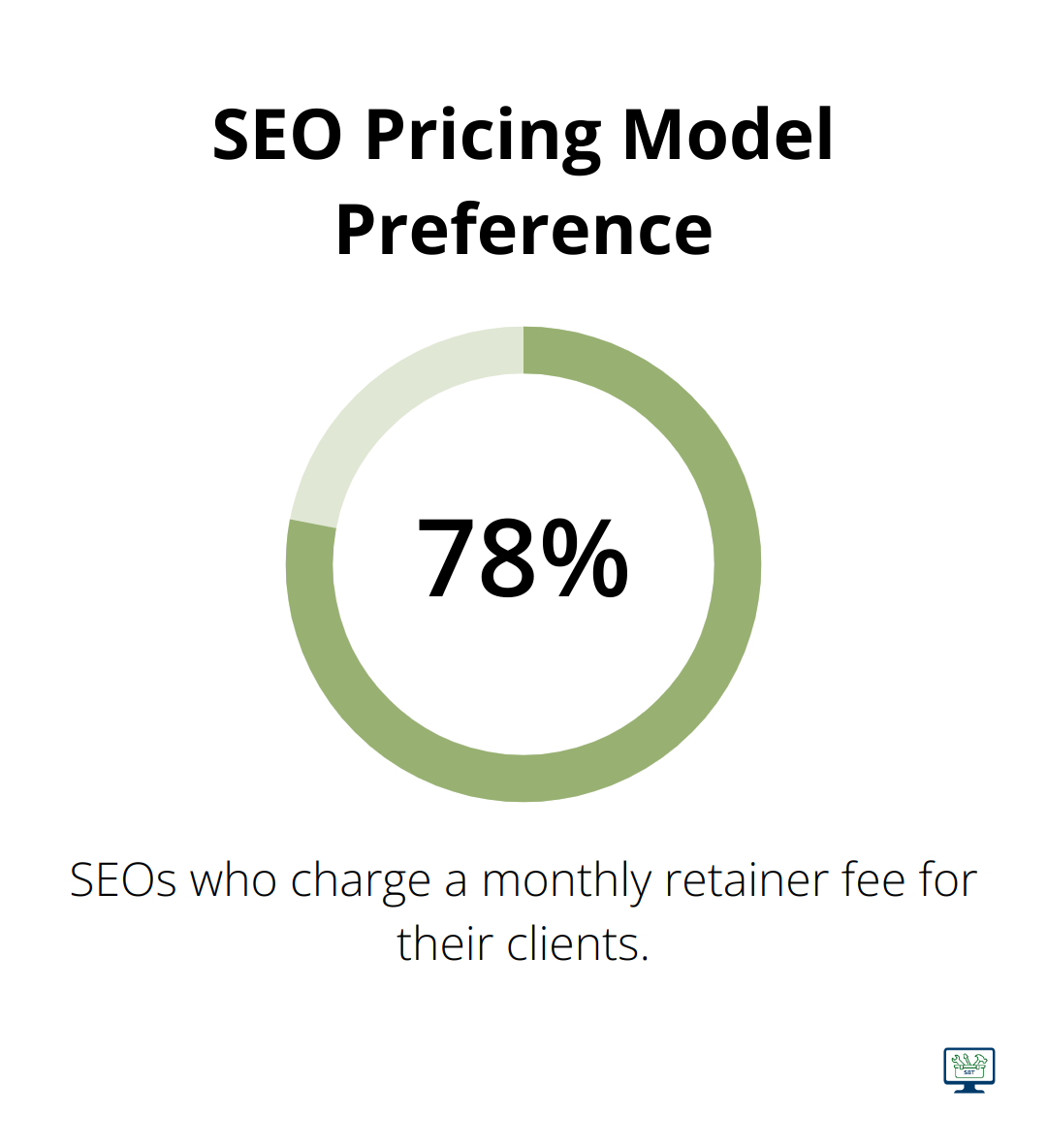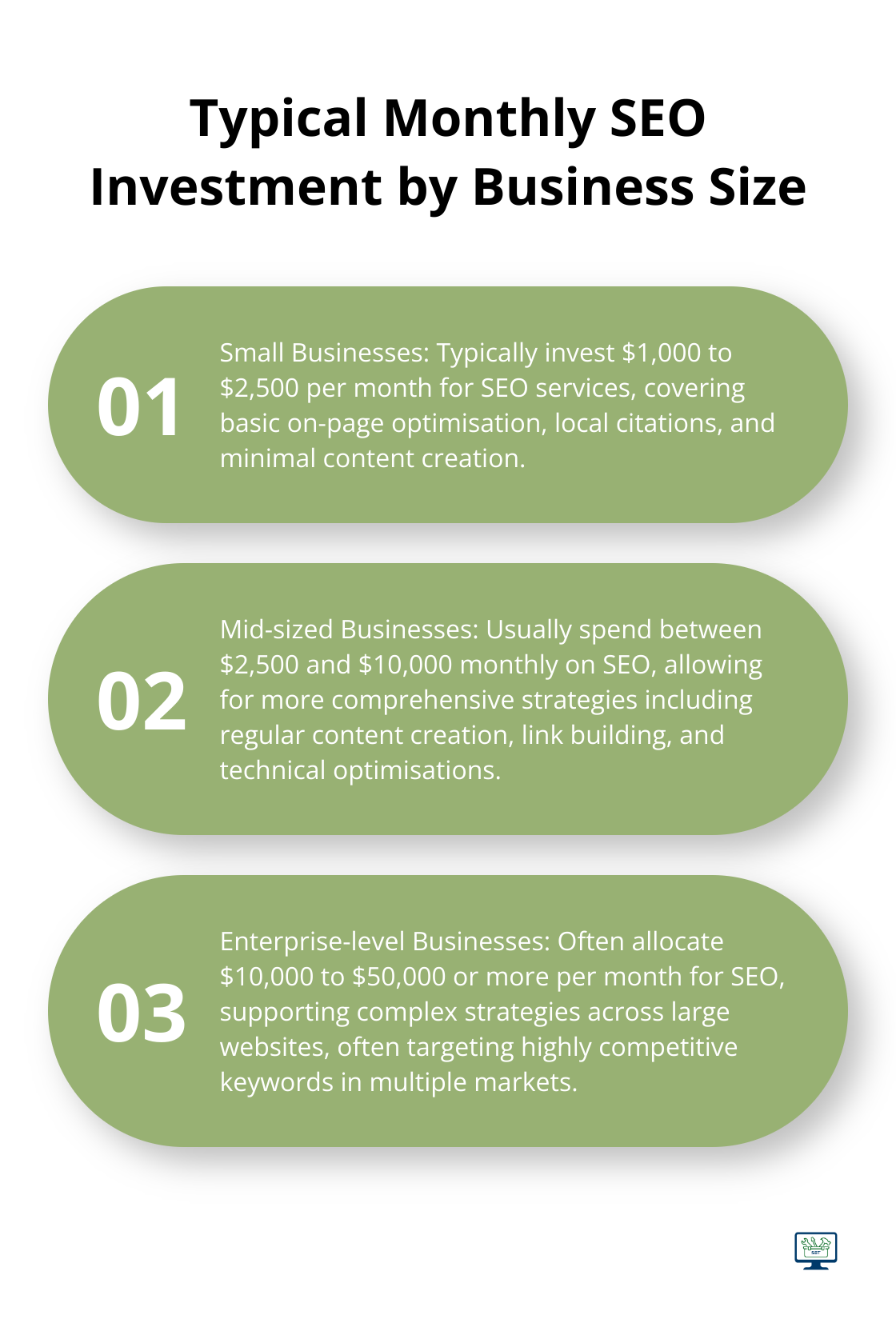How Much Do SEO Services Really Cost?

Published On Jun 15,2025
SEO prices can be a mystery for many businesses. At WebsiteStrategies, we often hear the question: “How much should I really be spending on SEO?”
The truth is, there’s no one-size-fits-all answer. SEO costs vary widely based on factors like project scope, industry competitiveness, and your current website condition.
In this post, we’ll break down the key elements that influence SEO pricing and provide insights into typical cost ranges for different business sizes.
What Drives SEO Costs?
SEO pricing varies significantly based on several key factors. Let’s explore the main elements that influence the cost of SEO services.
Project Scope and Complexity
The extent and intricacy of your SEO needs directly impact costs. A basic local business website might require simple on-page optimisation and local citations. In contrast, an e-commerce site with thousands of products demands a more comprehensive strategy. Projected SEO spending reaches $1.5 billion in 2025, up 12%, indicating the growing investment in SEO by Australian brands.

Industry Competitiveness
Your industry’s competitiveness plays a significant role in determining SEO costs. Highly competitive sectors (such as finance, law, and real estate) often require more aggressive strategies and higher budgets. A study by Ahrefs found that keywords in the financial sector can cost up to $50 per click in paid advertising, indicating fierce competition in organic search as well.
Geographic Targeting
Local SEO typically costs less than national or international campaigns. A local bakery in Sunshine Coast might invest $500-$1,500 per month, while a national retail chain could spend $5,000-$20,000 monthly for a comprehensive strategy. International SEO adds complexity with multi-language optimisation and region-specific strategies, further increasing costs.
Current Website Condition
The state of your existing website significantly impacts initial SEO costs. An outdated site with technical issues, poor content, and no prior SEO work will require more upfront investment. A good rule of thumb is to allocate 15–25% of your total digital marketing budget to SEO, depending on your business goals and specific circumstances.
Ongoing Maintenance and Updates
SEO isn’t a one-time fix but an ongoing process. Regular content updates, link building, and technical maintenance all contribute to long-term costs. The frequency and extent of these activities (which depend on your goals and competition) will affect your overall SEO budget.
Understanding these factors helps set realistic expectations for SEO investment. The key lies in aligning your SEO strategy with your business goals and budget for sustained growth. As we move forward, let’s examine the common pricing models used in the SEO industry.
SEO Pricing Models Explained
Monthly Retainer Packages
Monthly retainers dominate the SEO industry; 78.2% of SEOs charge a monthly retainer fee for their clients. These packages typically cost between $1,000 and $10,000 per month, based on the work scope and agency expertise. A small local business might pay $1,500 monthly for basic on-page optimisation and local citations. In contrast, a mid-sized e-commerce company could invest $5,000 for a comprehensive strategy (including content creation and link building).

Retainers offer consistency, allowing SEO teams to focus on long-term strategies without immediate result pressure. However, clients should establish clear deliverables and KPIs to ensure value for their investment.
Project-Based Pricing
Some businesses prefer one-time investments for specific SEO projects. This model suits website audits, keyword research, or initial on-page optimisation. Prices range from $1,000 for a basic SEO audit to $20,000 or more for a complete website overhaul.
Project-based pricing provides cost and deliverable clarity. It works well for businesses with specific, short-term SEO goals. However, it may not address ongoing SEO needs, which maintain and improve rankings over time.
Hourly Consulting Rates
SEO consultants often charge by the hour, with rates typically between $100 and $300. This model suits businesses that need expert advice on specific issues or want to supplement their in-house SEO efforts.
Hourly rates offer flexibility but can lead to unpredictable total costs. Clients should agree on a work scope and estimated hours upfront to avoid budget overruns.
Performance-Based Pricing
Some SEO providers tie fees to specific outcomes like ranking improvements or increased organic traffic. While this model might seem attractive, clients should approach it cautiously.
Performance-based pricing can encourage short-term tactics that may not align with long-term SEO best practices. Moreover, many factors outside an SEO provider’s control can influence rankings and traffic.
When selecting an SEO pricing model, businesses must align the structure with their goals and resources. The right model balances cost, flexibility, and results to drive sustainable online growth.
As we explore these pricing models, it’s important to understand how they translate into real-world costs for businesses of different sizes. Let’s examine typical price ranges for SEO services across various business scales.
SEO Pricing Across Business Sizes
Understanding the typical investment ranges for different business sizes can help you gauge where your SEO budget might fall. Let’s break down the common price ranges for small, mid-sized, and enterprise-level businesses:

Small Business SEO Costs
Small businesses typically invest $1,000 to $2,500 per month for SEO services. This budget usually covers basic on-page optimisation, local citations, and minimal content creation. A local plumber might spend $1,000 monthly for local SEO, while a small e-commerce store could invest $2,000 for more comprehensive services.
These lower-cost options often have limitations. They may not include advanced technical SEO or extensive content marketing. Small businesses should evaluate the services included carefully and consider how they align with their growth goals.
Mid-sized Business SEO Investment
Mid-sized businesses typically spend between $2,500 and $10,000 monthly on SEO. This increased budget allows for more comprehensive strategies, including regular content creation, link building, and technical optimisations.
For example, a regional law firm might invest $5,000 per month in SEO. This could cover ongoing content creation, local SEO for multiple locations, and targeted link building to boost authority in competitive legal niches.
Enterprise-level SEO Budgets
Large enterprises often allocate $10,000 to $50,000 (or more) per month for SEO. These substantial budgets support complex strategies across large websites, often targeting highly competitive keywords in multiple markets.
A national retailer might spend $30,000 monthly on SEO. This could include ongoing technical optimisations for thousands of product pages, content marketing campaigns, international SEO, and advanced analytics setups.
Enterprise SEO often requires specialised expertise. Many large companies work with top-tier agencies or build in-house teams, further increasing costs.
Additional Costs for Specialised Services
Beyond standard SEO packages, businesses often incur additional costs for specialised services. Content creation can range from $100 to $500 per article (depending on length and complexity). Link building services might charge $500 to $5,000 per month, based on the quality and quantity of links acquired.
Technical SEO audits, a crucial starting point for many campaigns, typically cost between $1,500 and $15,000, depending on website size and complexity. Website migrations or redesigns can add significant one-time costs, often ranging from $5,000 to $25,000 or more for large, complex sites.
Final Thoughts
SEO prices vary based on project scope, industry competitiveness, geographic targeting, and website condition. These factors help set realistic expectations for your SEO investment. A well-planned SEO campaign can drive sustainable growth and provide a strong return on investment.
When selecting an SEO service provider, consider their expertise, track record, and approach to SEO. Look for transparency in pricing and deliverables. A reputable provider should explain their strategies clearly and provide regular progress reports.
At WebsiteStrategies, we offer tailored SEO solutions to help businesses improve their online visibility (our team of experienced professionals develops customised strategies). We provide comprehensive SEO audits and offer one-on-one training to empower businesses to take control of their online presence.
